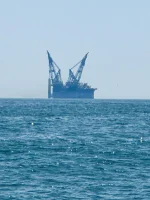The Day the Ocean Died
Don McLean called February 3, 1959 "the day the music died" - when Buddy Holly, Ritchie Valens, and The Big Bopper died in a plane crash. Not because music ended, but because something pure and irreplaceable was lost forever.
Standing on a boat last week, watching the first offshore wind turbine rise from waters I've known for decades, I felt that same crushing finality. This wasn't just renewable energy infrastructure. This was the day our ocean died.
Like McLean's plane crash, this single turbine represents a point of no return. It's the first of 54 planned for our local waters, with 3,000 more destined for the broader region. Just as you couldn't put Buddy Holly back on that stage, you can't restore an ocean once it's been industrialized.
McLean watched rock and roll transform from something authentic into something commercial and manufactured. We're witnessing our marine wilderness undergo the same transformation - from a living ecosystem into an energy factory. The music didn't actually die in 1959, but it became something fundamentally different. Our ocean won't die either, but what emerges will bear little resemblance to what we're losing.
From the boat, watching birds that have followed the same migration routes for millennia, I see the real cost. The constant thrum of turbine blades will drive away marine mammals that have used these waters as highways for thousands of years. Fish patterns, evolved over geological time, will be disrupted by structures that may not function reliably for two decades. We're trading eons of natural development for technology that's already showing signs of obsolescence.
There's no going back from this moment. Future generations will never know what it felt like to run offshore and see nothing but horizon in every direction. They'll never experience the profound silence of deep water, broken only by wind and waves. They'll inherit our industrialized ocean and assume this is how it's supposed to be.
McLean understood a universal truth about loss and change: not all change is progress. Not all progress is worth its cost. Sometimes what we're told is evolution is actually destruction wearing a better suit.
The day the music died wasn't February 3, 1959. It was the day we stopped asking whether the change was worth what we were losing. Our ocean faces the same choice now.
That first turbine isn't just generating electricity. It's generating a future where the ocean serves industry instead of life, where efficiency matters more than beauty, where the wild places that shaped us become footnotes to our energy policy.
From where I stand, that day was last Tuesday, when turbine number one broke the surface and changed everything forever.

